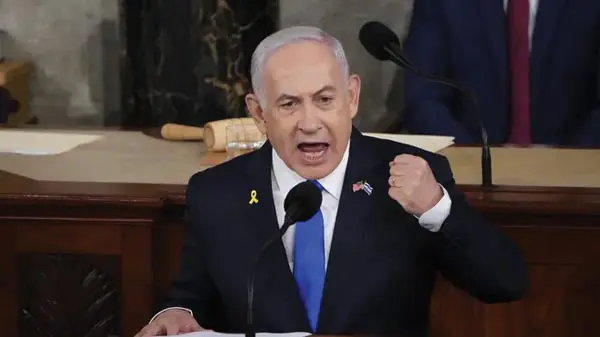NATION — Israeli Prime Minister Benjamin Netanyahu addressed a joint session of the U.S. Congress on July 24, 2024, marking his fourth appearance before the legislative body. Against the backdrop of the ongoing Israel-Hamas war in Gaza, Netanyahu’s speech emphasized Israel’s commitment to achieving “total victory” over the Palestinian militant group and rejected calls for a ceasefire.
“There is no other solution except total victory,” Netanyahu declared, underscoring the necessity of dismantling Hamas entirely. He firmly ruled out withdrawing Israeli Defense Forces (IDF) from Gaza or releasing Palestinian prisoners en masse, drawing both applause and criticism from U.S. lawmakers.
The Israeli leader’s address also included a denouncement of U.S. protectionism, a likely reference to the Biden administration’s pressure on Israel to de-escalate its military actions in Gaza. The U.S. has been advocating for measures to reduce civilian casualties and has been actively involved in ceasefire negotiations mediated by Qatar and Egypt.
Reactions to Netanyahu’s speech were deeply divided along party lines. House Speaker Mike Johnson and many Republican lawmakers expressed strong support for the Israeli Prime Minister, reinforcing the robust alliance between the U.S. and Israel. Johnson referred to Netanyahu as “a great friend of our country” and emphasized the shared commitment to defending democracy and combating terror.
However, over 100 Democratic lawmakers chose to boycott the speech, citing concerns over Netanyahu’s hardline approach and the devastating humanitarian impact of the conflict in Gaza. They called for a more balanced approach that addresses both Israel’s security needs and the suffering of Palestinian civilians.
Senate Majority Leader Chuck Schumer, despite his profound disagreements with Netanyahu, joined the invitation to stress the ironclad relationship between the two nations. However, he also voiced his criticisms publicly, reflecting the growing unease among Democrats regarding unconditional U.S. support for Israel amid the ongoing conflict.
Vice President Kamala Harris’s decision not to preside over or attend the speech further underscored the divisions within the Democratic Party. She delegated the duty to Senator Ben Cardin, a move that mirrored the increasing discomfort among some Democrats concerning the U.S.’s unwavering backing of Israel in light of the humanitarian crisis in Gaza.
Following his congressional address, Netanyahu visited Mar-a-Lago to meet with former President Donald Trump. The two leaders discussed strategies for dealing with Hamas and reiterated their commitment to combating terrorism and promoting stability in the Middle East. Trump, who has been a staunch supporter of Netanyahu and Israel, used the meeting to reaffirm his alliance with the Israeli Prime Minister, despite no longer holding office.
The Israel-Hamas war, which began in October 2023, has taken a heavy toll on both sides. As of July 2024, the conflict has resulted in over 40,000 deaths, with Gaza health authorities reporting 39,145 Palestinian fatalities, including a significant number of civilians, and Israel confirming 1,478 deaths on its side.
In response to the ongoing hostilities, the IDF has intensified its operations in Gaza, targeting Hamas infrastructure and leaders. Recent strikes have included an attack on a Hamas command center located in a school allegedly used to produce and store weapons.
Efforts to secure the release of hostages held by Hamas have been a central focus of the international community. Initially, 251 individuals, including children, women, and elderly people, were abducted by the militant group on October 7, 2023. As of July 2024, 116 hostages have been returned to Israel through prisoner exchange deals, unilateral releases by Hamas, and IDF rescue operations. Tragically, 65 hostages were reported killed either during the initial attack or while in captivity, and an additional 24 bodies have been repatriated. Currently, 115 hostages remain in Hamas captivity.
U.S. President Joe Biden has been actively involved in mediating a three-phase ceasefire deal, which includes provisions for the release of hostages in exchange for a lull in the fighting. Both Israel and Hamas have agreed on a framework, although significant challenges persist, particularly regarding Israel’s demands for screening displaced Palestinians returning to Gaza and maintaining control over Gaza’s border with Egypt.
The dire humanitarian situation in Gaza has attracted global attention, with international organizations and humanitarian groups working tirelessly to provide aid and support to the civilian population. The resumption of operations by World Central Kitchen, which provides meals to those affected by the conflict, underscores the ongoing efforts to alleviate the suffering on the ground.
Since the beginning of the conflict in October 2023, the United States has provided Israel with substantial financial assistance, totaling at least $12.5 billion in military aid. This includes $3.8 billion from a bill passed in March 2024, in line with the existing memorandum of understanding between the two countries, and an additional $8.7 billion from a supplemental appropriations act in April 2024.
U.S. military aid to Israel supports a wide range of activities, including grants for the purchase of American military equipment and services, as well as joint missile defense programs like the Iron Dome, David’s Sling, and Arrow II systems. This assistance plays a crucial role in maintaining Israel’s qualitative military edge in the region and bolstering its defensive and offensive capabilities during the ongoing conflict with Hamas.
As negotiations continue, the international community remains focused on achieving a lasting resolution to the conflict, addressing the urgent humanitarian needs in Gaza, and securing the release of all remaining hostages. The complexities surrounding the ceasefire talks, Israel’s military objectives, and the political dynamics within both Israel and the United States underscore the multifaceted challenges in finding a path to peace.
Netanyahu’s speech to Congress and his subsequent visit to Mar-a-Lago highlight the deep-rooted alliance between Israel and the United States, as well as the ongoing debates within American politics regarding the extent and nature of U.S. support for Israel. As the conflict persists, the international community must grapple with the delicate balance between Israel’s security concerns and the Palestinians’ aspirations for self-determination and an end to their suffering.
The road ahead remains uncertain. Only through a comprehensive and inclusive approach can the cycle of violence be broken and the foundation for a stable and peaceful future be laid.
— Stephan Lightman
Discover the Bullhead City Splash Pad at Community Park: A Family-Friendly Oasis
Discover the Bullhead City Splash Pad at Community Park: A Family-Friendly Oasis Updated October...
Read More



















